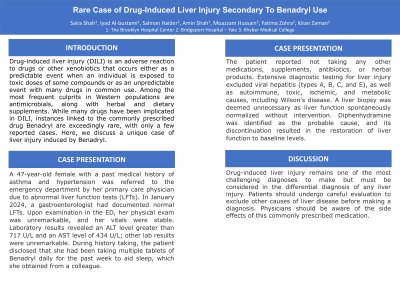Tuesday Poster Session
Category: Liver
P4870 - Rare Case of Drug-Induced Liver Injury Secondary to Benadryl Use
Tuesday, October 29, 2024
10:30 AM - 4:00 PM ET
Location: Exhibit Hall E


Saira Shah, MD
Brooklyn Hospital Center
Naugatuck, CT
Presenting Author(s)
Saira Shah, MD1, Iyad Al-bustami, MD, MPH(c)2, Salman Haider, MD1, Amin Shah, MBBS3, Moazzam Hussain, MBBS4, Fatima Zohra, MBBS5, Kiran Zaman, MD6
1Brooklyn Hospital Center, Brooklyn, NY; 2Brooklyn Hospital Center, Houston, TX; 3Khyber Medical University, Brooklyn, NY; 4Khyber Medical College, Peshawar, North-West Frontier, Pakistan; 5Khyber Girls Medical College, Peshawar, North-West Frontier, Pakistan; 6The Brooklyn Hospital Center, Brooklyn, NY
Introduction: Drug-induced liver injury (DILI) is an adverse reaction to drugs or other xenobiotics that occurs either as a predictable event when an individual is exposed to toxic doses of some compounds or as an unpredictable event with many drugs in common use. Among the most frequent culprits in Western populations are antimicrobials, along with herbal and dietary supplements. While many drugs have been implicated in DILI, instances linked to the commonly prescribed drug Benadryl are exceedingly rare, with only a few reported cases. Here, we discuss a unique case of liver injury induced by Benadryl.
Case Description/Methods: A 47-year-old female with a past medical history of asthma, hypertension, and alcohol abuse was referred to the emergency department by her primary care physician due to abnormal liver function tests (LFTs). In January 2024, a gastroenterologist had documented normal LFTs. Upon examination in the ED, her physical exam was unremarkable, and vitals were stable. Laboratory results revealed an ALT level greater than 717 U/L and an AST level of 434 U/L; other lab results were unremarkable. During history taking, the patient disclosed that she had been taking multiple tablets of Benadryl daily for the past week to aid sleep, which she obtained from a colleague. The patient reported not taking any other medications, supplements, antibiotics, or herbal products. Extensive diagnostic testing for liver injury excluded viral hepatitis (types A, B, C, and E), as well as autoimmune, toxic, ischemic, and metabolic causes, including Wilson's disease. A liver biopsy was deemed unnecessary as liver function spontaneously normalized without intervention. Diphenhydramine was identified as the probable cause, and its discontinuation resulted in the restoration of liver function to baseline levels.
Discussion: Drug-induced liver injury remains one of the most challenging diagnoses to make but must be considered in the differential diagnosis of any liver injury. Patients should undergo careful evaluation to exclude other causes of liver disease before making a diagnosis. Physicians should be aware of the side effects of this commonly prescribed medication.
Disclosures:
Saira Shah, MD1, Iyad Al-bustami, MD, MPH(c)2, Salman Haider, MD1, Amin Shah, MBBS3, Moazzam Hussain, MBBS4, Fatima Zohra, MBBS5, Kiran Zaman, MD6. P4870 - Rare Case of Drug-Induced Liver Injury Secondary to Benadryl Use, ACG 2024 Annual Scientific Meeting Abstracts. Philadelphia, PA: American College of Gastroenterology.
1Brooklyn Hospital Center, Brooklyn, NY; 2Brooklyn Hospital Center, Houston, TX; 3Khyber Medical University, Brooklyn, NY; 4Khyber Medical College, Peshawar, North-West Frontier, Pakistan; 5Khyber Girls Medical College, Peshawar, North-West Frontier, Pakistan; 6The Brooklyn Hospital Center, Brooklyn, NY
Introduction: Drug-induced liver injury (DILI) is an adverse reaction to drugs or other xenobiotics that occurs either as a predictable event when an individual is exposed to toxic doses of some compounds or as an unpredictable event with many drugs in common use. Among the most frequent culprits in Western populations are antimicrobials, along with herbal and dietary supplements. While many drugs have been implicated in DILI, instances linked to the commonly prescribed drug Benadryl are exceedingly rare, with only a few reported cases. Here, we discuss a unique case of liver injury induced by Benadryl.
Case Description/Methods: A 47-year-old female with a past medical history of asthma, hypertension, and alcohol abuse was referred to the emergency department by her primary care physician due to abnormal liver function tests (LFTs). In January 2024, a gastroenterologist had documented normal LFTs. Upon examination in the ED, her physical exam was unremarkable, and vitals were stable. Laboratory results revealed an ALT level greater than 717 U/L and an AST level of 434 U/L; other lab results were unremarkable. During history taking, the patient disclosed that she had been taking multiple tablets of Benadryl daily for the past week to aid sleep, which she obtained from a colleague. The patient reported not taking any other medications, supplements, antibiotics, or herbal products. Extensive diagnostic testing for liver injury excluded viral hepatitis (types A, B, C, and E), as well as autoimmune, toxic, ischemic, and metabolic causes, including Wilson's disease. A liver biopsy was deemed unnecessary as liver function spontaneously normalized without intervention. Diphenhydramine was identified as the probable cause, and its discontinuation resulted in the restoration of liver function to baseline levels.
Discussion: Drug-induced liver injury remains one of the most challenging diagnoses to make but must be considered in the differential diagnosis of any liver injury. Patients should undergo careful evaluation to exclude other causes of liver disease before making a diagnosis. Physicians should be aware of the side effects of this commonly prescribed medication.
Disclosures:
Saira Shah indicated no relevant financial relationships.
Iyad Al-bustami indicated no relevant financial relationships.
Salman Haider indicated no relevant financial relationships.
Amin Shah indicated no relevant financial relationships.
Moazzam Hussain indicated no relevant financial relationships.
Fatima Zohra indicated no relevant financial relationships.
Kiran Zaman indicated no relevant financial relationships.
Saira Shah, MD1, Iyad Al-bustami, MD, MPH(c)2, Salman Haider, MD1, Amin Shah, MBBS3, Moazzam Hussain, MBBS4, Fatima Zohra, MBBS5, Kiran Zaman, MD6. P4870 - Rare Case of Drug-Induced Liver Injury Secondary to Benadryl Use, ACG 2024 Annual Scientific Meeting Abstracts. Philadelphia, PA: American College of Gastroenterology.
